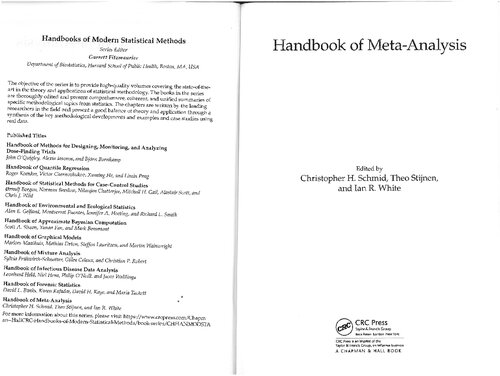

Most ebook files are in PDF format, so you can easily read them using various software such as Foxit Reader or directly on the Google Chrome browser.
Some ebook files are released by publishers in other formats such as .awz, .mobi, .epub, .fb2, etc. You may need to install specific software to read these formats on mobile/PC, such as Calibre.
Please read the tutorial at this link: https://ebookbell.com/faq
We offer FREE conversion to the popular formats you request; however, this may take some time. Therefore, right after payment, please email us, and we will try to provide the service as quickly as possible.
For some exceptional file formats or broken links (if any), please refrain from opening any disputes. Instead, email us first, and we will try to assist within a maximum of 6 hours.
EbookBell Team

4.4
62 reviews
ISBN 10: 1498703984
ISBN 13: 9781498703987
Author: Christopher H Schmid, Theo Stijnen, Ian White
Meta-analysis is the application of statistics to combine results from multiple studies and draw appropriate inferences. Its use and importance have exploded over the last 25 years as the need for a robust evidence base has become clear in many scientific areas, including medicine and health, social sciences, education, psychology, ecology, and economics.
Recent years have seen an explosion of methods for handling complexities in meta-analysis, including explained and unexplained heterogeneity between studies, publication bias, and sparse data. At the same time, meta-analysis has been extended beyond simple two-group comparisons of continuous and binary outcomes to comparing and ranking the outcomes from multiple groups, to complex observational studies, to assessing heterogeneity of effects, and to survival and multivariate outcomes. Many of these methods are statistically complex and are tailored to specific types of data.
1 Introduction to Systematic Review and Meta-Analysis
2 General Themes in Meta-Analysis
3 Choice of Effect Measure and Issues in Extracting Outcome Data
4 Analysis of Univariate Study-Level Summary Data Using Normal Models
5 Exact Likelihood Methods for Group-Based Summaries
6 Bayesian Methods for Meta-Analysis
7 Meta-Regression
8 Individual Participant Data Meta-Analysis
9 Multivariate Meta-Analysis
10 Network Meta-Analysis
11 Model Checking in Meta-Analysis
12 Handling Internal and External Biases: Quality and Relevance of Studies
13 Publication and Outcome Reporting Bias
14 Control Risk Regression
15 Multivariate Meta-Analysis of Survival Proportions
16 Meta-Analysis of Correlations, Correlation Matrices, and Their Functions
17 The Meta-Analysis of Genetic Studies
18 Meta-Analysis of Dose-Response Relationships
19 Meta-Analysis of Diagnostic Tests
20 Meta-Analytic Approach to Evaluation of Surrogate Endpoints
21 Meta-Analysis of Epidemiological Data, with a Focus on Individual Participant Data
22 Meta-Analysis of Prediction Models
23 Using Meta-Analysis to Plan Further Research
handbook of metaanalysis schmid
the handbook of research synthesis and meta analysis
handbook of metaheuristics pdf
handbook of meta analysis
handbook of meta analysis in ecology and evolution
Tags: Christopher H Schmid, Theo Stijnen, Ian White, Meta, Analysis